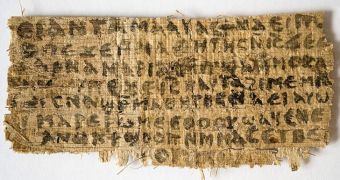An ancient papyrus scrap suggesting that Jesus had a wife has sparked a heated debate over Christian beliefs, and many have questioned its authenticity. Now, a team of experts who examined the piece have revealed that it is actually genuine.
The papyrus fragment, known as the “Gospel of Jesus' Wife,” was unveiled two years ago, but dates back to the eighth century A.D., as revealed by a series of just-released scientific reports.
The most controversial elements of the ancient document are some lines that suggest Jesus had a wife. The words “Jesus said to them, ‘My wife...She is able to be my disciple’” appear hand-written in Coptic script (ancient language used by Christians living in Egypt) on the three-inch (7.62-cm) scrap of papyrus.
Historians, engineers and linguists from Harvard, Princeton, Columbia and Australia's Macquarie University have examined the ink, papyrus, grammar and handwriting of the document in an attempt to find an answer to the question that was on everyone's lips: is the “Gospel of Jesus's Wife” authentic?
Harvard Divinity School, the same institution that had first introduced the text at a conference in 2012, announced on Thursday that new findings revealed the document was genuine, as experts didn't find any evidence of forgery in the papyrus scrap. It further added that it dated between the sixth to ninth centuries CE, and its contents were probably composed as early as the second to fourth centuries.
Scientists say the tests performed on the ancient document all point to its authenticity. According to Live Science, experts used a technique called micro-Raman spectroscopy, which measures the scattering of light from a sample, to reveal that the carbon in the ink matched other samples found in papyrus documents form the same period of time.
“All of the evidence points to it being ancient. As historians, the question then becomes, what does it mean?” historian Karen L. King, of Harvard Divinity School, said.
King, whose specialties include Coptic literature, Gnosticism and women in the Bible, explains that the fragment was never meant to prove that Jesus had a wife. She thinks that the piece points out to early Christian debates on the role of women in churches and on whether it was better for Christians to remain celibate or to marry and have children.
“This gospel fragment provides a reason to reconsider what we thought we knew by asking what the role claims of Jesus' marital status played historically in early Christian controversies over marriage, celibacy and family,” King said in a statement.
However, there still are experts who sustain the papyrus is a clever fake, like Brown University Egyptology professor Leo Depuydt, who claims the grammatical mistakes and the similarities to another well-known non-canonical biblical text prove it is a forgery.

 14 DAY TRIAL //
14 DAY TRIAL //